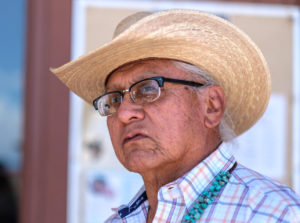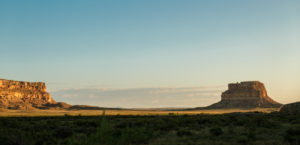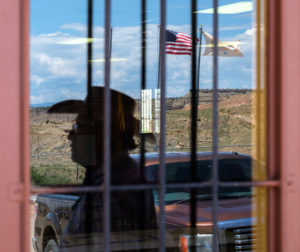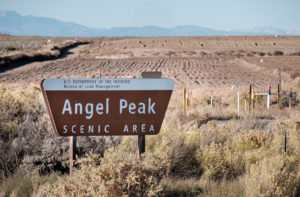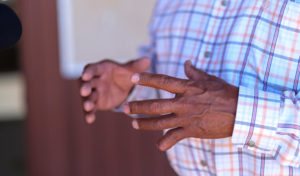DANIEL
“We’ll still be here.”
Former Navajo Nation Council Delegate
“Sacred Places are not just points on a map, or where longitude and latitude cross. Sacred spaces, sacred places are the total landscape. So in this respect, when somebody says, ‘Where are you from?’ It’s just this whole landscape.”
“For anybody else, if they saw those rocks on the hills, or the mesas, [they would say] ‘Wow, we could harvest those and cut them up and make money.’ But no, people just leave it, leave it, because the natural landscape is what brings beauty to this place.”
“[I sometimes] saddle a horse and go on a mesa and see the herds of horses that come to a watering place, to where the different color colored stallions and their harems would be grouped in parts of the area. They would all take turns to water and then go off into the hill and then the next group would come and the next group would come and go water and they would go off to their own respective, probably what would be called territories… Most of it’s in the morning before it even gets hot.”
“I had heard the radio announcements that there was going to be a gathering [about oil and gas] at Nageezi Chapter, at Counselor Chapter, but it never really hit me because at the time I thought it was still just the vertical drilling.”
“I had gotten certified mail, saying, ‘Sign the lease, these are the [allotment] parcels that are going to be leased, your share is going to be this amount, when you sign the leases this is the check you’ll get.’”
“I went to the land agent’s office and basically questioned him. That’s where I found out … there would be hydraulic fracturing, the vertical drilling and then the horizontal drilling. I basically said, ‘I don’t want to sign,’ and he said, ‘Okay let me see your letter,’ and he pulled up the allotments and the leases and then he just smirked and said, ‘I don’t need your signature, I’ve already got 72% [allottee] approval, 91% approval, 96% approval.’”
“A few phone calls later I found out that none of the folks [who approved], the relatives who were part of the allotments, they really never knew it was going to be horizontal drilling.”
“[Now] over 94% of the lands in this area is leased.”
“My conjecture is, the Republicans, the oil developers (they’re almost one and the same) they knew what was coming, because they went after the four-lane highway 550. They knew that the impacted areas would be concerned about water, so they funded the Cutter Lateral to bring water, to supplement the drinking water system out in this area.”
“So the apprehension of ‘You’re going to ruin the aquifer’ was diminished because you’ve got public water now. What I’m saying is, strategic development has taken place and they really didn’t come into the communities and say, ‘This is coming at you, this is coming at you.’”


